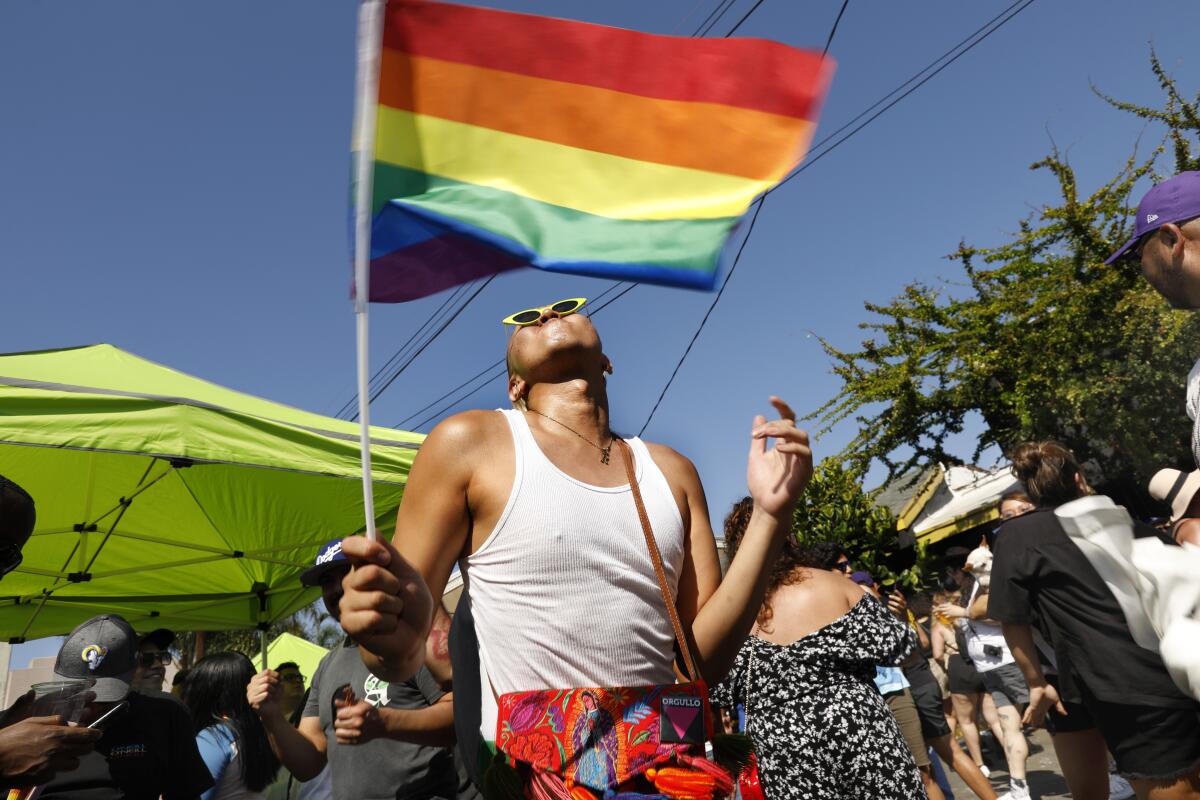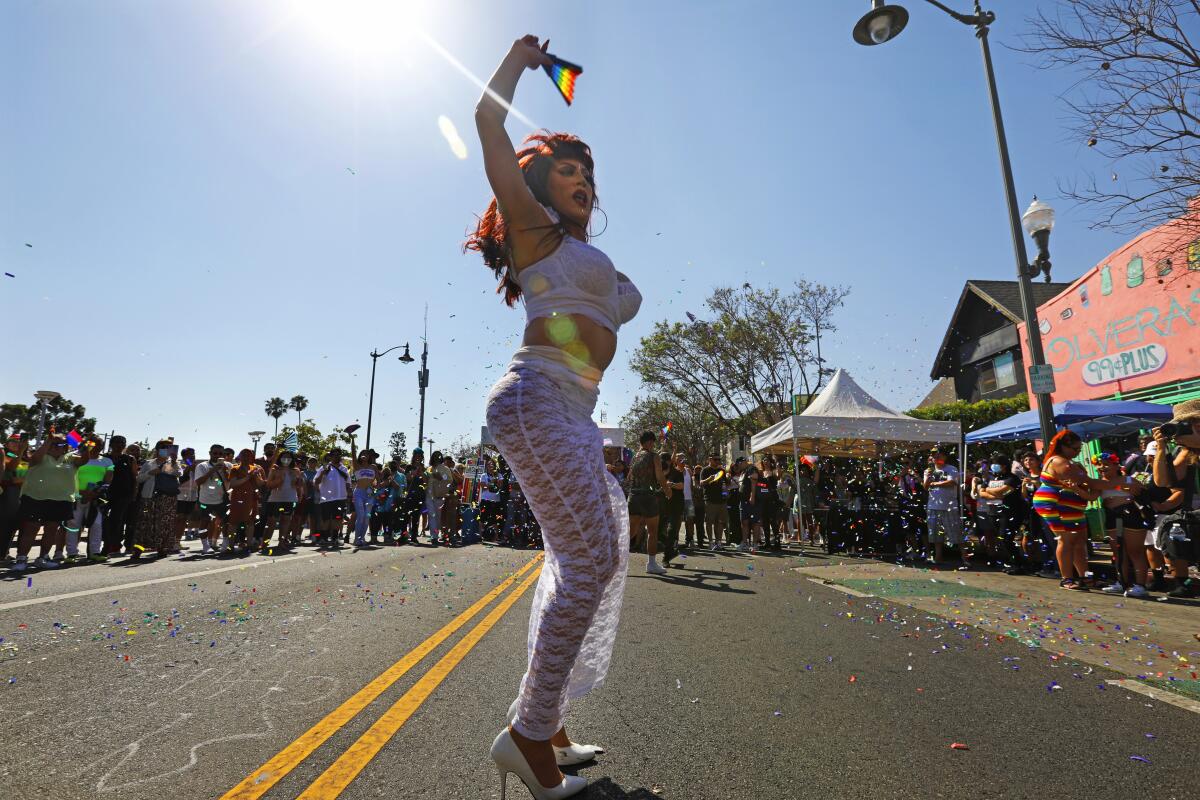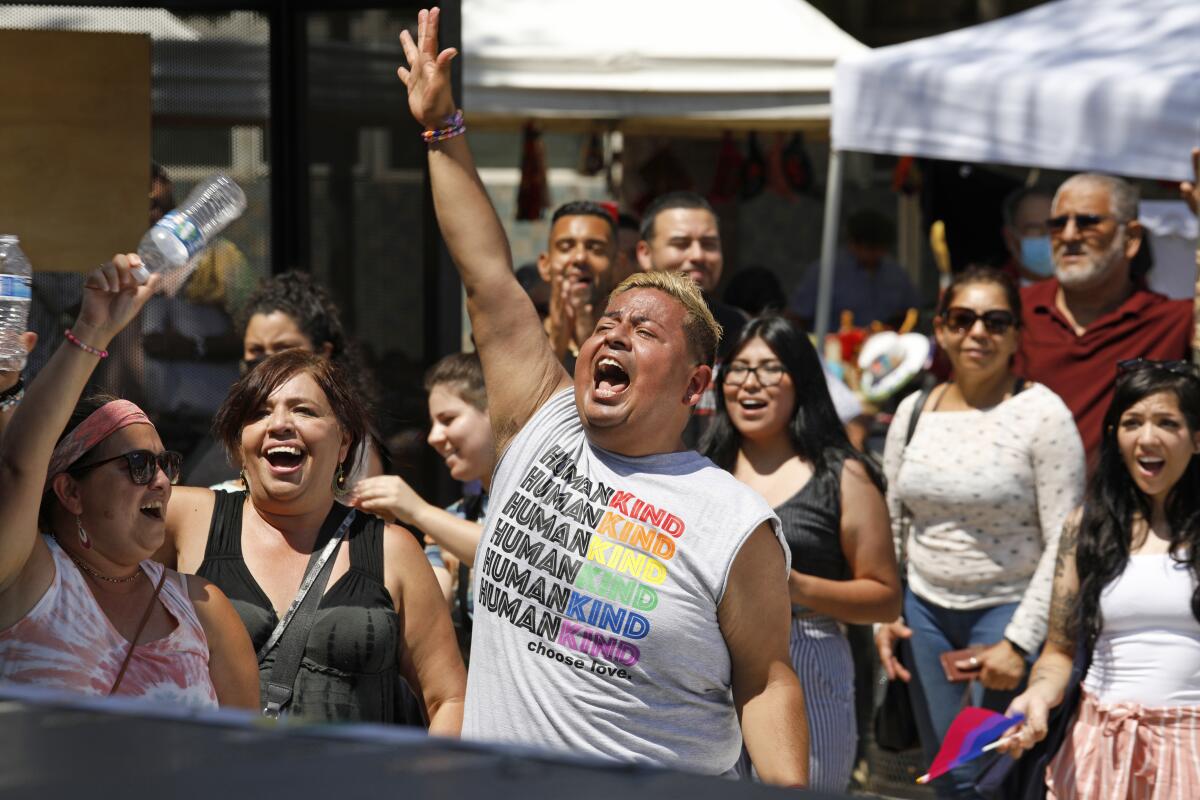Inaugural Orgullo Fest brings gay pride to Boyle Heights

- Share via
Donning a fuchsia gown with over-the-top white ruffles and a bright yellow shawl, drag queen Yulianna Flores belted out classic ranchera songs as the crowd sang along, waving their pride flags in the air.
Chelo’s “Que Sacrificio” might not be the typical drag performance you’d see at any other pride festival. But Orgullo Fest in Boyle Heights was full of performers singing and dancing cumbia, mariachi and more.
Orgullo Fest, Boyle Heights’ first pride festival, took place over the weekend, welcoming revelers after a year and a half of pandemic restrictions on gatherings. It kicked off with the host, drag performer Melissa Befierce, introducing mariachi group Los Dorados de Villa. Performers in drag lip-synced every hour to Latin American classics and modern hits, like Doja Cat’s “Moo” and Male Fe’s “La Vaca.”
Under midday sunshine, 1st Street became a dance floor. The event’s final act was a performance by Banda Las Angelinas.
Get the Latinx Files newsletter
Stories that capture the multitudes within the American Latinx community.
You may occasionally receive promotional content from the Los Angeles Times.
Luis Octavio, co-founder of Noa Noa Place and organizer of the pride event, said he hopes the event signals a clear message for queer Latinx folks in L.A.: “Bienvenidos a casa,” he said. Welcome home. “You no longer have to leave your community to celebrate yourself.”

Organizing such an event amid a pandemic in just over a month’s time was an ambitious affair, even for the self-proclaimed serial entrepreneur who opened a gay bar, also in the middle of the COVID-19 crisis.
He opened Noa Noa Place, named after a Juan Gabriel song, six months ago, after being hospitalized led him to reevaluate his life plan. If there was one thing he wanted to leave behind in the world, a gay bar in a predominantly Latino community was it, he said.
A free pride festival to go with it made sense, he said.
“In 2019, I had the opportunity to go to Mexico City and attend their pride event. I was so overwhelmed with the sea of brown people at this pride festival and … I saw people from so many walks of life.”
Octavio wondered why L.A. pride festivals include small stages catering to Latinx LGBTQ folks when they make up half the population.
“Latinx people are the general market in Southern California. There’s no reason why we still to this day get a small stage.”
Octavio started organizing the event in May, when a representative from Councilman Kevin de León’s office visited his bar. He pitched the idea, figuring it would plant a seed for a 2022 event. To his surprise, the councilman’s office gave him a green light, and he and his co-founders rushed to make the event happen.
“It has been so exciting to work with the LGBTQIA+ community in Boyle Heights to launch their first ever Orgullo Fest during pride month,” De León said in a statement. “This event embodies the true spirit of Los Angeles, that anyone who makes this city their home is free to be their true selves with a sense of belonging.”
“It’s about time,” said Felipe Agredano-Lozano, LGBTQ faculty liaison for the Los Angeles Community College District and Boyle Heights resident.
Agredano-Lozano has been involved in a planned pride festival in South Gate since 2019. The pandemic interrupted plans for that festival, which organizers hoped would cater to queer young people from all over southeast L.A.
But he’s happy that someone else made it happen and that it’s no surprise that Orgullo Fest is in his neighborhood.

Boyle Height’s 1st Street between Soto and Chicago streets was lined with booths promoting resources, including the L.A. LGBTQ Center, Mi Centro, Alta Med and Bienestar. The event offered free HIV testing and COVID-19 vaccinations.
Vendors, their booths decorated with rainbow-colored flags, balloons and papel picado banners, sold handmade leather bags, artwork and jewelry. Attendees were of all ages and all backgrounds— tias, abuelas, allies and pedestrians lured by the free rainbow conchas.
Jossie Piña, 84, said her neighbor who makes floral crowns and is a vendor at the event told her about Orgullo Fest, exclaiming that there would be drag queens performing. Piña made the three-block walk to check it out.
“It’s really nice. I’m glad there’s a festival like this en el barrio where I can actually come attend,” the lifelong Boyle Heights resident said, adding that normally events this large are less accessible to her. “I like to see the mariachi.”
Alejandra Gutierrez, 49, said her daughter learned about Orgullo Fest on Instagram. The event quickly became a family affair, as she invited her sister, daughters, grandchildren and nieces.
“It’s the best,” she said. “We’re tired of being inside, so when we found out there was an event near home, we said, “Let’s go!”
Gutierrez placed a pride flag in her hair, some rainbow pins and stickers on her shirt, and danced with the drag queens.
“I think it’s good because a lot of people can come learn about other people and their feelings,” the Boyle Heights resident added. “At the end of the day, we’re all human beings.”
Felipe sees Orgullo Fest as symbolic of a greater shift: The queer scene is moving to the Eastside, he said. That’s exemplified by the fact that both the West Hollywood and Long Beach pride festivals, usually the area’s largest, were canceled in favor of smaller events throughout the cities.
“Bienvenidos a casa. You no longer have to leave your community to celebrate yourself.”
— Luis Octavio, organizer of the pride event
Now, Orgullo Fest is taking shape in an area that could very well become a new safe haven for queer Latinx folks, with Redz and Noa Noa Place anchoring each end of this stretch of 1st Street. With its long queer history, the shift feels right, Felipe said.
Queer activists have been out and organizing for decades, he said. In the 1990s, there were several iterations of LGBTQ committees partly made of up of Eastside organizers who attempted to put together similar events. They were successful in hosting a few in the L.A. area.
“It’s not surprising that, 40 years later, there’s a pride festival in Boyle Heights. I think it’s a wonderful thing.”
The celebration holds special significance for a community that lacks safe queer spaces compared with West Hollywood and other cities with major support for LGBTQ folks, or those who may feel rejected by religious or traditional family members. But Octavio emphasized that the Latinx community has always been family-oriented and is not as close-minded when it comes to sexuality as people may think.
When he opened Noa Noa, Octavio expected at least a small amount of backlash from elder Latinos who might not want a queer bar in the area. That hasn’t happened.
“We need to give our parents, our grandparents, our uncles, tias, a lot more credit,” he said. “They have sat in our establishment, had a beer and even given our drag queens a dollar.”
And at Orgullo Fest, they did the same.
More to Read
Sign up for Essential California
The most important California stories and recommendations in your inbox every morning.
You may occasionally receive promotional content from the Los Angeles Times.












